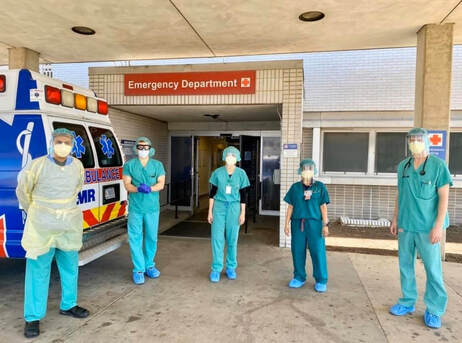 Dr. Budhrani Dr. Budhrani In this episode, we interview Dr. Budhrani, who has been practicing clinically for over 20 years as an emergency room (ER) physician, is the CEO of Innovation Health, whose goal is to unify the health care system to making the patient experience easier and more affordable, and is a professor at George Washington (GW) School of Medicine. We are grateful that he was able to make the time to speak with us about the impact COVID-19 is having on the medical system as a whole, the mental and physical health of front line health workers and their families, and what resources are available to them. Dr. Budhrani believes it is critical for health care providers to have a seat at the table when discussing what the ‘new’ world will look like and how to get people back to work, back to school, etc. He also explains how coordination of care is key. That healthcare industries need to share data and manage populations in a coordinated fashion to prevent the virus from spreading, and to inform the public health response for future pandemics, or a second wave. He says thinking of COVID-19 as ‘going away’ is a dangerous assumption, but rather thinking about how to manage and prevent it's spread are going to be the keys to our success going forward. Not simply rolling the dice and hoping it will go away. When we sat down with Dr. Budhrani, we were in the midst of the country realizing that although front line staff are ‘heroes’, they are still humans who need support. Right before our interview, news came out that a New York doctor had taken her own life, a doctor in Washington DC announced on social media how difficult it is to bury his emotions, and Governor Cuomo, Governor of New York, committed additional funding to support mental health services for front line staff. We caught him at a time when our country and our listeners needed to hear how to help front line workers and how front line workers can get the support they need. In response to this, Dr. Budhrani describes the stress he feels each time he thinks about entering the ER, with new guidelines and policies being enacted every day. How he leaves home with two layers of clothing knowing the top layer will be exposed and how much he needs to think about things he rarely considered before such as being well-groomed and having adequate personal protection equipment (PPE). Stating that in reality, he is now going in “physically armed” to work. Hearing that, we asked him why he would go back into the ER right now having an already full plate with Innovation Health and teaching. “If you are blessed with the opportunity to have the knowledge to help someone, then I think we feel as though we have a moral obligation to impart that knowledge, especially right now. In our lifetime there has not been a clinical tragedy at this scale that has affected so many lives across the world, and I feel a moral obligation to serve. That’s what drives me to go into the ER.” He explains further that despite feeling hot and claustrophobic in layers of PPE for 10 hours at a time, and how that can make a person “mildly delusional,” in this climate there is something really satisfying about being able to help someone. "I think that is a significant driver of all of us who do this.” “We’re seeing some of the greatest impact on mental health and physical health on these front line folks, and they need to be addressed now so it doesn’t erupt like a volcano later.” “Working on the front line these days is like going to war, and a lot of these folks are built to contain these feelings and thoughts in order to do their jobs.” He explains how he and other front line health staff often internalize their stress and anxiety because they think people will not understand. He stresses the importance of finding an outlet to explore these feelings because the longer this goes on, the more it collects and builds inside. He says there are two main things we need to do in order to support front line health workers’ mental health:
While this is already a lot, colleagues of his who are working longer hours or picking up extra shifts have actually moved out and are completely isolating from their families. “That is an amazing sacrifice. To put yourself at risk like this, and isolate yourself from your family, is not why any doctor went into this work. But I know it’s happening to thousands of people on the front line everyday. I hope we can change the procedures, protocols, and testing so that families no longer have to be torn apart.” He leaves us with an emphasis on the fact that “we are in this together, now more than ever.” No matter your political opinion, race, or gender. This virus has the potential positive impact of uniting us as a country, as a world, and as micro communities in a way nothing in our lifetime has. So while it’s tragic for many, he urges us to think about the concept that we are in this together and about our obligation to each other to make sure all of us as a world and country are safe. Self-care activities
Using your commute as a transition: Dr. Budhrani described experiencing anxiety before heading into the ER, and a lengthy process upon arriving home to ensure it is safe for him to enter his house. For this activity we suggest using your commute in both directions as a transitional time. Using the commute there as a way to prepare and shield yourself for what you are walking into, and your commute home as a way to leave the hard things at work. Anything you can think of is open to you but here a couple suggestions for each end of your commute:
Messages of love and support: Dr. Budhrani described part of his physical armor being a second layer of clothes. We suggest that on your under layer of clothing, you can have family members or loved ones write messages of love and support to carry with you throughout your shift. If you don’t have access to family or loved ones right now, you can write these messages for yourself. Let this be a reminder as you layer up, as you work, and as you layer down, that you are supported and are not alone. If you have children, this can be a powerful way to let them know that their support matters to you. Using art to connect with family through isolation: If you are isolating from your family right now as Dr. Budhrani explained, art can be a powerful way to stay connected. You can tell children in words that you are okay but as mostly visual processors, it can be a lot easier to trust those words if there are images to go along with them. There are several apps which allow users from multiple devices to draw on the same canvas and, if this is possible for you, we urge you to use this as a socially distant way to create with your children. A simple search will bring up more but two we suggest are DrawPile and Scribble Together Whiteboard. You can start with a simple Pictionary game where you draw something and the other person tries to guess what it is. You can work on one picture, without a specific topic, over the course of several days. If you want to take it further you can draw images of what you will do when you get back together. Lastly, you can draw parts of your individual days to share with each other. Giving your child an age appropriate visual insight into what you are doing with your days can go a long way in helping them trust that you are ok and feel connected to you. In turn, allowing them to share parts of their day with you will let them know that you still value knowing parts of their story. Leave your judgement of art at the door. You don’t have to be an ‘artist’ or make the prettiest picture for this to work. By letting go of your judgement, you are teaching your children to embrace their art without judgement and opening the door to creativity and connection. You can listen to the full episode of the podcast here. Please don’t forget to subscribe and give us a rating wherever you listen to your podcasts. Lastly, please email us at info@playingtolive.org if you know of someone who you’d like to hear on our show, or topics you’d like for us to discuss. Until next time, take care of yourself!
0 Comments
Leave a Reply. |
AboutIn Season 1 of Finding the Helpers, we are bringing personal stories of front line staff and families impacted by COVID-19. Our diverse guests will be invited to share their story of being on the front line, and in combination to their story, two expressive art therapists will provide art and creative activities that will support the challenges the individual and their family is facing. These could include ideas for short relaxation techniques to be done on the front line, creative ways to explain in kid friendly terms what is happening, ways to stay connected to family and children during long periods of isolation, etc. Throughout the podcast, conversation will include mental health insight related to the pandemic, anxiety and stress, grief and loss, resiliency, coping skills, and understanding the pandemic. Presented by the nonprofit Playing to Live's, whose history began in 2014 as a grassroots program focused on bringing play and creativity in the midst of the Ebola deadly viruses. Following our work in Ebola, we have continued our work as advocates and creators for play and expression across the globe in refugee settings, post war countries, and in the United States of America.
AuthorLindsay Bingaman is the Regional Program Manager for Playing to Live, based in Nairobi, Kenya. Archives |



 RSS Feed
RSS Feed